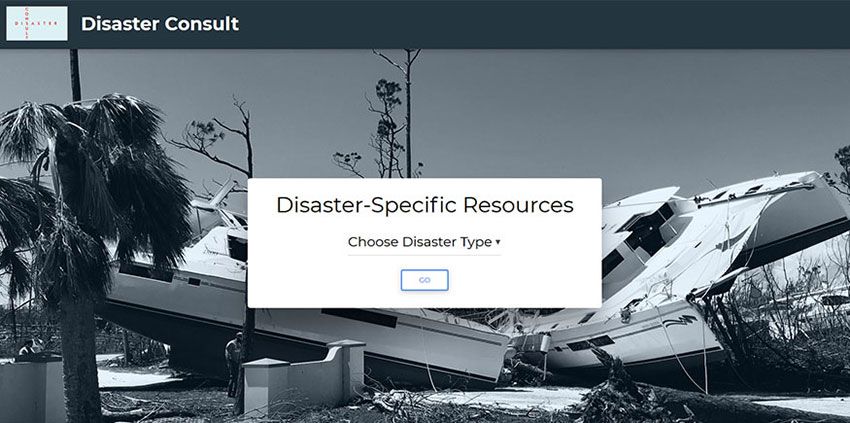
In March 2020, not long after the arrival of COVID-19 in the United States, a team at the George Washington University (GW) mobilized to quickly launch the Disaster Consult, an online database providing relevant, accurate, digestible, and timely information to health care workers responsible for responding to disasters.
Jordan Selzer, MD, developed the idea for the platform in 2019. A disaster and operational medicine fellow at the GW School of Medicine and Health Sciences (SMHS), Selzer connected with then-second year MD student Adam Munday, who is in the Disaster Medicine Scholarly Concentration at SMHS, to oversee the technical aspects of the project. The project was still in the planning phase, following a brief pause in development; then came COVID-19.
“Once COVID-19 came around, Jordan ramped it into high gear and that’s when Disaster Consult evolved pretty rapidly,” said Munday. Participating in the project, Munday added, gave him the opportunity to bring together his interest in disaster medicine and web design and app development.
“This tool allows us to bring together a wide range of experts and knowledge and put it all in one place that’s easy to access,” he said. “It’s going to benefit a lot of places … communities that aren’t really expecting a disaster to happen and might not have a robust disaster plan. … We get into the nitty gritty of different kinds of disasters and that’s how we stratify things.”
Fourth-year MD student Neel Duggal got involved in March after receiving an email from Selzer asking for help creating content for the website, then focused entirely on COVID-19. Duggal, who has experience as a medical writer, jumped at the chance.
“When I received that email, our clinical rotations had been suspended, so I had new free time,” he said. “I wanted to engage in helping out frontline providers from a safe distance. I thought this would be a great way to help out. I also thought Disaster Consult was a great way to immerse myself in the research of the virus and pandemic because it has so greatly affected our health care system and society, and will continue to for years to come.”
Duggal is responsible primarily for content related to COVID-19. To keep track of the latest information on the virus and pandemic, he follows daily news blast from journals such as JAMA, The Lancet, and the New England Journal of Medicine. He has focused on content related to treatment, public health, pediatrics, and psychiatry. Duggal said he also hopes to pitch in on content related to civil unrest and chemical exposure.
In light of increasing protests around racial injustice, the team also launched a section of the site devoted to civil unrest and its associated injuries stemming from such things as pepper spray, chemical agents, and rubber bullets, among others. Volunteers who work on the project are sorted into teams based on their interests; some also focus on mass shootings and others on explosive disasters.
“This kind of resource is important for a few reasons,” said Duggal. “It provides quick, actionable information providers can use in a variety of emergency situations. Additionally, there are few resources tailored towards emerging disasters, as research around them tends to be light due to the rapidly evolving nature of them. However, it’s still important that providers have distilled, evidence-based information that they can act to improve health outcomes for their patients.”
The platform was developed in collaboration with Lance Hoffman, PhD, a distinguished research professor in the GW School of Engineering and Applied Science, and includes a team of medical students, residents, disaster medicine physicians, and engineering students.
The Disaster Consult team is constantly evolving and is always open to medical students interested in disaster and emergency medicine who are looking to help out.


